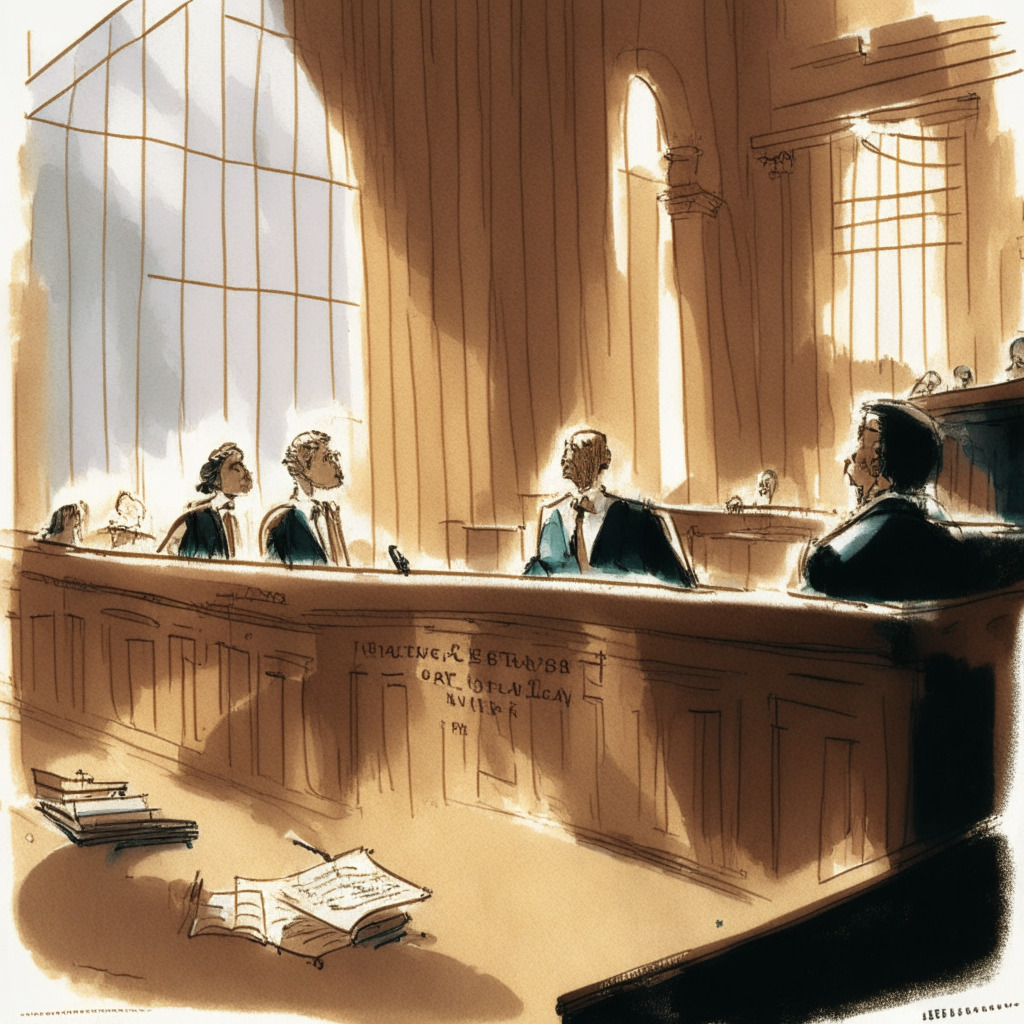“Regulation in the crypto world came under scrutiny after a lawsuit backed by Coinbase challenged the U.S. Treasury Department’s sanctions on Tornado Cash, a crypto transaction platform. Despite uproar from the crypto community, a judge ruled that the Treasury acted within its powers, escalating the ongoing tension between crypto advocates and regulatory bodies.”
Search Results for: Paul Chan
Coinbase’s Trading Slump: A Sombre Wave or the Calm Before a Strong Rally?
“Leading U.S. crypto exchange Coinbase reveals a 70% drop in consumer trading volume due to decreasing market capitalization of cryptocurrencies, stable Bitcoin prices, and less opportunities for significant returns. Despite regulatory scrutiny and downtrend, Coinbase maintains an optimistic outlook, backed by reported increased Q2 revenue and reduced losses.”
The Coinbase vs SEC Showdown: Ripple Effects on Crypto Bets, New Hopes, and Instabilities
The crypto market faces uncertainty due to an ongoing lawsuit between Coinbase and the SEC, but certain cryptocurrencies such as GMX, Cowabunga, XDC Network, Chimpzee, and Injective display promising trends. However, given the high-risk nature of crypto assets, careful investment is advised.
Coinbase CEO’s Firm Stand on Staying in U.S. Despite Regulatory Hurdles: A Brave New Path?
“Coinbase CEO, Brian Armstrong, recently dispelled rumors of the crypto exchange planning a move from the U.S. amid regulatory challenges. Armstrong affirmed the company’s commitment to navigate the U.S. regulatory environment, highlighting the need for pioneers and regulators to work together for technological growth and consumer protection.”
Unmasking Anonymous Crypto With Arkham: Wintermute’s Increased Holdings Spark Curiosity
Wintermute Trading has recently removed over eight million ARKM tokens from Binance, increasing their position in the ARKM token by 731%. This positions them as the 10th largest holder of ARKM. Given their involvement with the dox-to-earn platform of Arkham Intelligence, speculation surrounds Wintermute’s intentions with these tokens.
The SEC Caution to Crypto Accounting Firms: Transparency vs. Honest Endeavors
The SEC’s chief accountant, Paul Munter, issued a statement warning accounting firms against working with crypto platforms beyond comprehensive financial audits. He believes crypto firms may selectively present their business to deceive accounting firms and clients. Meanwhile, Commissioner Hester Pierce countered this, saying such caution could inhibit crypto platforms’ honest efforts.
Ethereum’s Switch to Proof-of-Stake: A Sustainable Step or a Misdirected Move?
“Ethereum’s shift from proof-of-work to proof-of-stake, known as the “Merge”, is viewed differently by stakeholders. While the move reduced Ethereum’s energy demands and is hailed as a ‘green’ shift, it overlooks the ongoing significant energy consumption from graphics processing units previously used in mining. Moreover, perspectives on security and profitability under the new system remain contentious.”
Blockchain Gaming Revolution: Spielworks’ Refundable NFTs and the Balance of Innovation and Caution
Blockchain gaming startup Spielworks has partnered with Mycelium Network to create a refundable Non-Fungible Token (NFT) program. The NFTs, named “Reverties”, allow gamers to receive full refunds in USD Coin through a new minting mechanism. Additionally, interest from the decentralized finance lending pool contributes to environmental causes. However, potential challenges include the sustainability of the program and uncertainty over user reception of the new minting process.
New Hampshire Court Ruling: A Potential Marker or Stumbling Block for Future Crypto Sales?
The recent ruling by Judge Paul Barbadoro in the SEC vs LBRY case has potentially impacted the course of future crypto sales proceedings. The decision highlights the ambiguity surrounding secondary market sales of cryptocurrencies, with the Judge not taking a clear stance on whether registration requirements apply. This event underscores the uncertainty of the regulatory landscape for cryptocurrencies, emphasizing the need for enhanced understanding and caution among users and investors.
Zapple Pay: Ingenious Loophole or a Move in the Crypto-Tech Giants Chess game?
Bitcoin-friendly social app Damus recently confronted Apple over the removal of a bitcoin tipping feature, deemed a violation of Apple’s guidelines. Two Bitcoin developers, Ben Carman and Paul Miller created Zapple Pay, a workaround service using emojis, restoring the “zap” feature. The fate of this creative solution remains uncertain as cryptocurrency platforms continue to challenge tech giants.
Unlocking America’s Financial Future: The Role of Cryptocurrencies and the Ongoing Regulatory Conflict
“Coinbase’s chief legal officer, Paul Grewal, asserts that cryptocurrencies are an integral part of America’s financial future, providing new opportunities. Yet, concerns over regulatory standards protecting against potential crypto pitfalls underline that responsible investment and stringent regulation are needed in tandem.”
Ark vs BlackRock: Battle for the First Spot-Bitcoin ETF Approval Heating Up
ARK Investment Management believes it has secured frontrunner status for spot-Bitcoin ETF approval, despite BlackRock leading the race. USDC CEO Jeremy Allaire mentioned well-regulated custody infrastructures, mature spot markets, and effective market surveillance as factors supporting potential approval.
FCA Leadership Shift: Impact on Crypto Regulation and Industry Future
Binu Paul, former head of digital assets at the FCA, leaves the organization after nine months, and Victoria McLoughlin steps in as interim Head of Market Interventions for digital assets. This leadership change occurs amid the FCA’s intense focus on regulating the emerging crypto industry and enforcing stricter advertising rules for crypto services. McLoughlin’s experience at the FCA signals a continued stable approach to cryptoasset regulation.
Zimbabwe’s Gold-Backed Digital Tokens: A Solution to Hyperinflation or Just a Mirage?
The Reserve Bank of Zimbabwe issued gold-backed digital tokens to stabilize the local currency and offer an alternative to the Zimbabwean dollar. However, experts argue that digital tokens alone cannot tackle high money supply growth, the root cause of the economic problem, and suggest focusing on macroeconomic policies and controlling money supply growth instead.
Failed Crypto Boss MasterClass: Examining Bankman-Fried’s Controversial Downfall
Sam Bankman-Fried’s MasterClass tutorial was scrapped amid controversies and connections with Hollywood agent-turned-investor Michael Kives. The crypto boss faces fraud charges related to FTX’s collapse, highlighting the potential dangers and pitfalls within the cryptocurrency industry.
Navigating the Regulatory Dilemma: Binance, Coinbase and the SEC’s Ambiguous Stance
The legal complications faced by Binance and Coinbase highlight the inconsistent and unclear approach adopted by regulatory bodies like the SEC. Increased collaboration and well-defined guidelines could ensure stability and growth of the cryptocurrency market, balancing security and innovation.
Algorand’s Upgrade Showdown: Increased Efficiency vs. Potential Risks
Algorand’s proof-of-stake blockchain recently introduced a significant protocol upgrade aimed at speeding up transactions and improving application development efficiency. The most notable enhancement is the block time reduction from 3.8 to 3.3 seconds, fostering competitiveness and user confidence in this ever-evolving space.
AI-Assisted Music in 2024 Grammy Awards: Embracing Innovation or Killing Creativity?
AI-generated music gains recognition as the Recording Academy updates the 2024 Grammy Awards rules to include AI-assisted music, provided human authorship remains significant. This move poses ethical challenges, yet reflects ongoing efforts to balance technology with human creativity in an evolving music industry.
US Court Awaits SEC Reply: The Impact on Crypto Regulations and Industry Uncertainty
The United States Court of Appeals for the Third Circuit has retained jurisdiction in Coinbase’s pursuit of regulatory clarity from the SEC, demonstrating the importance of transparent crypto regulations. This development marks a potentially pivotal moment for the future of the cryptocurrency industry in the United States, as the forthcoming SEC report could significantly impact the market.
Coinbase vs SEC: Battle for Crypto Regulation Clarity and the Future of US Crypto Industry
Coinbase’s Chief Legal Officer, Paul Grewal, criticizes the SEC’s evasive responses as Coinbase seeks a higher court to issue a “mandamus” obligating the regulator to create rules and standards for the crypto industry. The SEC’s actions have fueled skepticism about its intentions and effectiveness in regulating the market, leading to increased regulatory uncertainty and challenges in the US crypto landscape.
Apple’s Gaming Potential vs High Cost: Exploring Metaverse & Gaming Cryptos on Blockchain
Apple may enhance its gaming platform with a VR/AR headset in 2024 and software for playing Windows games on Mac. Meanwhile, tokens SAND, MANA, and AXS face SEC complaints, and GameStop’s new CEO plans to enter the crypto space with an NFT marketplace.
SEC Standoff with Coinbase: Quest for Clear Crypto Regulations and Its Market Implications
Coinbase has filed an official request in federal court seeking a court order to compel the SEC to set clearer rules and standards for the digital assets industry. The ongoing standoff highlights the uncertainty surrounding crypto regulations, as the lack of a definitive regulatory framework creates challenges for the evolving industry and its stakeholders.
Coinbase Battles SEC for Swift Crypto Regulation Response: Impact on Industry & Investors
Coinbase recently urged the U.S. Court of Appeals for the Third Circuit to compel the SEC to respond swiftly to their rulemaking petition, amid regulatory uncertainty surrounding cryptocurrencies. As stakeholders, monitoring these developments is essential for the growth and adoption of blockchain technology, markets, and safety.
SEC’s Impossible Registration Demands: The Debate on DEX Regulation and Cryptocurrency Authority
Coinbase Chief Legal Officer Paul Grewal opposes the SEC’s proposed rule change requiring decentralized exchanges (DEXes) to register, saying it’s impossible and fundamentally flawed. The rule change extends SEC authority to products ill-equipped for regulatory requirements and has been criticized by US lawmakers and crypto advocacy groups.
SEC vs Coinbase: Crypto Regulatory Clarity Dilemma and the Path Forward
The SEC has been urged by Coinbase to clarify how securities laws apply to cryptocurrencies, but may take months to respond. This highlights the need for clear regulatory guidelines in the fast-growing crypto industry, as existing laws may not adequately serve the digital asset market.
SEC’s Elusive Crypto Regulations: Balancing Clarity with Industry Innovation
The U.S. SEC recently filed its response to Coinbase’s writ of mandamus seeking clarity on crypto regulations, causing frustration within the cryptocurrency community. The commission’s reluctance to commit to a clear deadline highlights the delicate balance between wanting regulatory clarity and protecting the long-term health of the crypto industry.
SEC vs Coinbase: Battle Over Crypto Rules & Future of Blockchain Regulation
The SEC has yet to clarify new crypto rules in response to Coinbase’s petition, as crypto exchanges seek regulatory clarity. This ongoing battle highlights regulatory challenges accompanying emerging blockchain technologies and digital assets, shaping the future of cryptocurrency regulation.
SEC vs Coinbase: Balancing Regulation with Crypto Innovation Amid Ongoing Conflict
The SEC has yet to respond to Coinbase’s petition for rulemaking amid ongoing enforcement action against the crypto platform. The regulatory landscape raises questions about balancing strict adherence to existing laws with the need for innovation in the rapidly evolving cryptocurrency ecosystem. The SEC’s decision will impact market participants and the future of the crypto industry.
SEC’s Response to Coinbase Petition: Debate on Regulatory Clarity and Crypto’s Future
The SEC responded to Coinbase in a court-requested clarification, stating that a decision regarding Coinbase’s rulemaking petition should be available within 120 days. The development is part of the ongoing lawsuit between the regulatory agency and the crypto exchange on operating unregistered securities.
Landmark Bill on Crypto Tokens Exemption: Boon or Bane for Securities Laws and Investors?
The McHenry-Thompson draft bill aims to exempt cryptocurrency tokens from securities laws by creating a new asset class labeled “digital assets.” While it gains attention and support, the bill raises concerns regarding regulatory arbitrage and presents challenges reconciling the crypto industry’s goals with existing legislation, causing uncertainties for companies and investors.
The Battle to Remove SEC’s Gensler: Legal Complexities and Crypto Community Backlash
U.S. lawmakers introduced the SEC Stabilization Act, intending to fire SEC Chair Gary Gensler over allegations of misconduct and abuse of power. However, removing an independent agency official is legally complex, involving criteria like inefficiency, neglect of duty, or malfeasance. The act could restructure the SEC and shift authority among commissioners.
Robinhood’s Crypto Trading Plunge: Delistings, SEC Scrutiny, and Market Uncertainty
Robinhood Markets Inc. reported a 68% decrease in crypto trading in May 2023 compared to the previous year. The decline followed the firm’s delisting of Cardano, Polygon, and Solana as the SEC declared them securities. This highlights the challenges faced by the crypto industry regarding regulatory compliance and market fluctuations.































